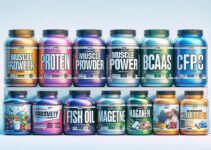You've probably heard that what you eat can have a significant impact on your physical recovery, but have you considered the role of anti-inflammatory foods in muscle repair? Incorporating specific foods into your diet can help reduce inflammation and promote faster muscle recovery after intense workouts. But which foods should you be focusing on? Let's explore some top anti-inflammatory options that can support your muscle recovery and overall athletic performance.
Key Takeaways
- Blueberries, fatty fish, turmeric, dark leafy greens, nuts, and seeds are all beneficial for muscle recovery due to their anti-inflammatory properties.
- Including blueberries in post-workout smoothies or snacks can aid in reducing muscle inflammation and promoting faster recovery.
- Consuming fatty fish like salmon, mackerel, and sardines provides omega-3 fatty acids that help reduce inflammation and speed up muscle recovery.
- Turmeric, with its anti-inflammatory compound curcumin, can be added to meals, smoothies, or sprinkled onto roasted vegetables for its muscle recovery benefits.
- Dark leafy greens, such as spinach or kale, contain vitamins, minerals, and antioxidants that reduce inflammation and promote muscle recovery.
- Nuts and seeds, especially those high in omega-3s like walnuts, flaxseeds, and chia seeds, are excellent sources of plant-based protein and support muscle recovery by reducing inflammation.
Blueberries
Incorporating blueberries into your post-exercise nutrition can aid in reducing muscle inflammation and promoting faster recovery. Blueberries are packed with antioxidant benefits, particularly from compounds called anthocyanins, which have been shown to reduce muscle soreness and inflammation after strenuous exercise. Including blueberries in your post workout smoothie recipe can provide a convenient and delicious way to harness these benefits. Try blending a handful of blueberries with some Greek yogurt, a banana, and a splash of almond milk for a refreshing and nutrient-packed post-exercise treat. The antioxidants in blueberries help to combat the oxidative stress that occurs during intense physical activity, which can contribute to muscle fatigue and soreness. By including blueberries in your post-exercise routine, you can provide your body with the support it needs to recover more quickly and efficiently. So, next time you reach for a post-workout snack or smoothie, consider adding some blueberries to help your muscles bounce back faster.
Fatty Fish
Consuming fatty fish can support muscle recovery by providing essential omega-3 fatty acids, known for their anti-inflammatory properties and their role in aiding muscle repair and reducing post-exercise soreness. Omega-3 benefits include reducing inflammation in the body, which can speed up recovery after intense workouts. Fatty fish such as salmon, mackerel, and sardines are rich sources of these beneficial fatty acids. When incorporating fatty fish into your diet, consider cooking methods that preserve their nutritional value. Grilling, baking, or broiling fatty fish are great options as they retain the omega-3 content without adding unhealthy fats. Avoid deep-frying, as this can introduce unhealthy trans fats and diminish the health benefits of the fish. By choosing suitable cooking methods, you can maximize the anti-inflammatory benefits of fatty fish and promote muscle recovery. Including fatty fish in your diet a few times a week can be a practical and effective way to support your muscles' recovery process, making it easier to get back to your workouts feeling strong and ready to perform.
Turmeric
Turmeric, a vibrant yellow spice commonly found in curry dishes, contains a compound called curcumin known for its potent anti-inflammatory properties, which can aid in muscle recovery after intense exercise. Adding turmeric to your diet can be a delicious way to promote muscle recovery. You can incorporate turmeric into your meals by trying out various turmeric recipes. For instance, you can make a turmeric-infused smoothie by blending coconut milk, pineapple, banana, and a teaspoon of turmeric. This not only creates a refreshing drink but also provides the anti-inflammatory benefits of turmeric. Another option is to sprinkle turmeric onto roasted vegetables or add it to soups and stews for both flavor and health benefits.
In addition to its culinary uses, turmeric offers numerous health benefits. Its active compound, curcumin, has been shown to reduce inflammation, which can help alleviate muscle soreness and aid in recovery after exercise. Consuming turmeric regularly can contribute to overall muscle health and help maintain an active lifestyle. By incorporating turmeric into your meals, you can harness its anti-inflammatory properties to support muscle recovery and promote overall well-being.
Dark Leafy Greens
After benefiting from the anti-inflammatory properties of turmeric, you can further support muscle recovery by incorporating dark leafy greens into your diet. Dark leafy greens, such as kale, spinach, and Swiss chard, are packed with essential nutrients that can aid in reducing inflammation and promoting muscle recovery.
- Nutrient benefits
- Dark leafy greens are rich in vitamins A, C, and K, as well as minerals like iron, calcium, and magnesium, which are crucial for muscle function and repair.
- These greens also contain powerful antioxidants, such as flavonoids and carotenoids, which help combat oxidative stress and reduce inflammation in the body.
- Cooking tips
- To retain the maximum nutritional value, consider lightly steaming or sautéing dark leafy greens instead of boiling them.
- Incorporate them into smoothies, salads, stir-fries, or soups for a delicious and nutritious boost to your meals.
Including dark leafy greens in your diet can provide a natural and effective way to support your muscle recovery process, while also contributing to your overall health and well-being.
Nuts and Seeds
Incorporate a variety of nuts and seeds into your diet to harness their anti-inflammatory properties and support muscle recovery. Nuts and seeds are excellent sources of plant-based protein, making them a valuable addition to your post-workout meals. They contain essential amino acids that aid in muscle repair and recovery. Additionally, nuts and seeds are rich in healthy fats, including omega-3 fatty acids, which have been shown to reduce inflammation in the body. Walnuts, flaxseeds, and chia seeds are particularly high in omega-3s.
Including a mix of almonds, pistachios, pumpkin seeds, and sunflower seeds in your diet can provide a wide range of nutrients that support muscle health. These nutrient-dense foods also contain antioxidants and micronutrients such as vitamin E, magnesium, and zinc, which play a role in reducing exercise-induced muscle damage and promoting recovery.
To maximize the benefits, consider adding a handful of mixed nuts and seeds to your yogurt, salad, or smoothie. This simple adjustment can significantly enhance your nutrient intake and support your body's recovery process after physical activity.
Frequently Asked Questions
Can These Anti-Inflammatory Foods Also Help With Joint Pain and Arthritis?
Can these anti-inflammatory foods help with joint pain and arthritis? Research findings suggest effectiveness. Incorporate dietary recommendations; cook with turmeric, ginger, and fatty fish. These foods can aid in reducing inflammation and provide relief.
Are There Any Specific Serving Sizes or Portion Recommendations for Each of These Foods to Maximize Their Anti-Inflammatory Benefits?
For optimal anti-inflammatory benefits, focus on portion control and meal planning. Consider nutrient absorption and any dietary restrictions. It's essential to tailor serving sizes to your individual needs and consult a nutritionist for personalized recommendations.
Are There Any Potential Interactions or Side Effects to Be Aware of When Consuming These Foods in High Quantities?
When consuming anti-inflammatory foods in high quantities, it's important to be aware of potential interactions and side effects. Consider dietary considerations and consult a healthcare professional if you have any concerns about consuming these foods in large amounts.
How Do These Foods Compare to Over-The-Counter Anti-Inflammatory Medications in Terms of Effectiveness for Muscle Recovery?
When comparing anti-inflammatory foods to over-the-counter medications for muscle recovery, research studies indicate that certain foods can be as effective. However, long-term use and efficacy may vary, so it's important to consult with a healthcare professional for personalized advice.
Can These Foods Be Incorporated Into a Post-Workout Meal or Snack to Enhance Muscle Recovery?
After your workout, incorporating anti-inflammatory foods into your post-workout nutrition can enhance muscle recovery. These foods can help reduce inflammation, aiding in the repair and rebuilding of muscle tissue, making them a valuable addition to your workout routine.


